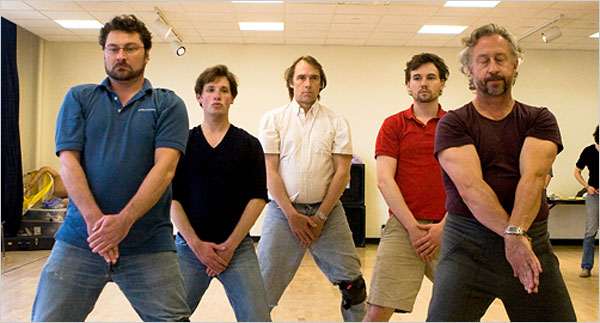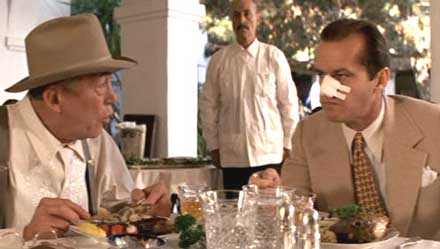 The Letter opens in fifteen days. This morning I fly to the West Coast (again!) to see two shows at the Will Geer Theatricum Botanicum. On Sunday I’ll travel from Los Angeles to Santa Fe via Albuquerque, and from then until July 25 I’ll devote virtually the whole of my time and energy to my first opera. Not all: I’ll have to write three pieces while I’m in Santa Fe. Such is the life of a working journalist. But most of my Wall Street Journal copy is already filed and edited in advance for the next three weeks, and I’m going to do my damnedest to finish writing the rest of it before I hit town.
The Letter opens in fifteen days. This morning I fly to the West Coast (again!) to see two shows at the Will Geer Theatricum Botanicum. On Sunday I’ll travel from Los Angeles to Santa Fe via Albuquerque, and from then until July 25 I’ll devote virtually the whole of my time and energy to my first opera. Not all: I’ll have to write three pieces while I’m in Santa Fe. Such is the life of a working journalist. But most of my Wall Street Journal copy is already filed and edited in advance for the next three weeks, and I’m going to do my damnedest to finish writing the rest of it before I hit town.
No, it doesn’t seem real–not quite, not yet. I’ve been exchanging several phone calls each day with Paul Moravec, who’s already out in Santa Fe helping to rehearse The Letter, but I still can’t believe it’s really, truly happening, no doubt because I haven’t seen it yet. That comes when I report to the Santa Fe Opera House on Monday. I hope I’ll have the presence of mind to blog and tweet about what I see there, but don’t be surprised if I dry up for a day or two out of sheer excitement. Nothing like this has ever happened to me before, and I can’t wait for it to start.
Archives for July 10, 2009
TT: Pericles’ excellent adventures
In today’s Wall Street Journal drama column I report on my recent visit to the Hudson Valley Shakespeare Festival, where I saw Pericles and Much Ado About Nothing. Here’s an excerpt.
* * *
Hardly anybody does “Pericles,” which was staged just once in the 19th century and remains to this day the least well known of Shakespeare’s plays. If you want to embarrass a critic, ask him to summarize the plot and watch him start stammering. (It’s happened to me!) Now that the recession has caused American theater companies to pull in their horns and play it safe, revivals have become scarcer still. All the more reason, then, to laud the Hudson Valley Shakespeare Festival for taking a chance on “Pericles,” and to praise Terrence O’Brien, the festival’s artistic director, for giving it a staging so lucid, genial and persuasive that you’ll go home wondering why it isn’t as popular as “Twelfth Night.”
 The trouble with “Pericles” is that it lacks the inexorable momentum of Shakespeare’s best-loved plays, which hurtle toward their denouements like bullets toward the bull’s-eye. Not so this sprawling tale of a Phoenician prince who wanders from adventure to adventure, driven by the lash of increasingly implausible coincidence and the skullduggery of the 60-odd characters who share the stage with him. Yes, there’s a plot, but it’s so loosely knit that Shakespeare launches each act with a prologue whose sole purpose is to keep the audience in the picture. By the time Pericles is finally reunited with his long-lost wife and daughter, you’ll probably have forgotten how they disappeared in the first place.
The trouble with “Pericles” is that it lacks the inexorable momentum of Shakespeare’s best-loved plays, which hurtle toward their denouements like bullets toward the bull’s-eye. Not so this sprawling tale of a Phoenician prince who wanders from adventure to adventure, driven by the lash of increasingly implausible coincidence and the skullduggery of the 60-odd characters who share the stage with him. Yes, there’s a plot, but it’s so loosely knit that Shakespeare launches each act with a prologue whose sole purpose is to keep the audience in the picture. By the time Pericles is finally reunited with his long-lost wife and daughter, you’ll probably have forgotten how they disappeared in the first place.
How can a modern-day director bring “Pericles” into focus? By simultaneously playing its absurdities with tongue in cheek and taking its serious moments seriously. That, at any rate, is Mr. O’Brien’s approach, and it works perfectly. He gives us, among other delightful things, pirates with avast-me-hearties accents and funky dances complete with lip-synching–yet everyone in his 19-member cast is capable of turning on a dime and speaking Shakespeare’s verse sweetly and sonorously whenever the situation calls for eloquence….
John Christian Plummer’s staging of “Much Ado About Nothing” is no less typical of the Hudson Valley approach. Instead of coming up with an over-elaborate directorial concept that obscures the plain meaning of the text, Mr. Plummer is content to cloak his well-chosen cast in a riotous medley of mismatched costumes, some of which look as though they came from the cantina scene in “Star Wars” and the rest from “Only Angels Have Wings.” The rest he leaves to the actors, and in particular to Nance Williamson and Jason O’Connell, who play Beatrice and Benedick, the reluctant lovers, as well as I’ve seen them played….
* * *
Read the whole thing here.
TT: The perfect film score
 June 20 marked the thirty-fifth anniversary of the original theatrical release of Chinatown, for me the best American film of the Seventies. I also think that Jerry Goldsmith’s score, which lost out at the Oscars to The Godfather, Part II, is one of the half-dozen best film scores of the twentieth century. Many people know that it was written under severe time pressure, but few know the full story of how Goldsmith was brought in at the last minute to compose a new score for Chinatown. In this week’s “Sightings” column I tell that story, and pay tribute to one of the best pieces of postwar American music–regardless of genre.
June 20 marked the thirty-fifth anniversary of the original theatrical release of Chinatown, for me the best American film of the Seventies. I also think that Jerry Goldsmith’s score, which lost out at the Oscars to The Godfather, Part II, is one of the half-dozen best film scores of the twentieth century. Many people know that it was written under severe time pressure, but few know the full story of how Goldsmith was brought in at the last minute to compose a new score for Chinatown. In this week’s “Sightings” column I tell that story, and pay tribute to one of the best pieces of postwar American music–regardless of genre.
To find out more, pick up a copy of Saturday’s Wall Street Journal and see what I have to say.
UPDATE: Read the whole thing here.
TT: Almanac
“Insects sting, not in malice, but because they want to live. It is the same with critics: they desire our blood, not our pain.”
Friedrich Nietzsche, Human All-too-Human
